
On 11 December 2024, a group of frustrated taxi drivers gathered outside Crawley Borough Council’s town hall to voice their concerns about cross-border hiring practices at Gatwick Airport. The drivers, backed by the Unite union, are calling for stricter enforcement of local licensing laws, particularly against Uber’s operations, which they argue are undermining the livelihoods of Crawley-licensed drivers.
This protest highlights growing tensions in the local taxi industry, with drivers accusing Gatwick Airport and Uber of promoting unfair practices that allow out-of-borough drivers to compete in Crawley without adhering to the same regulations.
Crawley’s taxi licensing laws require drivers to hold a Crawley-issued licence to operate legally within borough limits, including at Gatwick Airport. However, local drivers claim that London-licensed Uber drivers are exploiting loopholes to bypass these regulations and gain an unfair competitive edge.
Recent statistics illustrate the scale of the issue. Crawley Borough Council has licensed 590 private hire vehicle (PHV) drivers to operate in the area. However, data from Transport for London (TfL) reveals that 531 TfL-licensed drivers are operating within the RH postcode area, which includes Gatwick Airport. Of these, 300 are based in Crawley’s RH10 and RH11 districts. This overlap has intensified competition, creating frustration among local drivers who feel disadvantaged.
Unite regional officer Dominic Rothwell has been vocal about the issue, describing the situation as a “race to the bottom” for working conditions. He criticised Gatwick Airport’s partnership with Uber, arguing that it prioritises corporate interests over the needs of local operators.
In response to concerns over safety and compliance, TFL conducted a compliance patrol at Gatwick Airport on 29 July 2024. During this operation, five TfL officers inspected 32 vehicles and their drivers, uncovering six violations, including:
While Gatwick Airport lies outside London’s jurisdiction, TfL remains responsible for ensuring that vehicles it licenses adhere to safety and regulatory standards, even when operating beyond the capital. These patrols, however, do little to address the larger issue of cross-border hiring, which continues to fuel tensions in the local taxi industry.
Local drivers, supported by the Unite union, have called on Crawley Borough Council to take decisive steps to address cross-border hiring. Rothwell has been particularly critical of the council’s perceived inaction, stating:
“Crawley Council must enforce its taxi licensing laws to level the playing field for local drivers. It’s unacceptable for London-based Uber cars to pick up fares in Crawley under the guise of pre-booked rides. These practices hurt local businesses and workers who are already struggling to compete.”
The union has also criticised Gatwick Airport’s business model, accusing it of prioritising partnerships with large corporations like Uber at the expense of local operators. Rothwell added:
“Gatwick Airport should not be aligned with an employer like Uber that promotes a race to the bottom. Our members are determined to fight back, but the lack of action from Crawley Council leaves them at a significant disadvantage.”
Crawley Borough Council has acknowledged the concerns raised by local drivers and confirmed that legal advice is being sought to address the issue. However, many drivers feel that the council’s response has been too slow, leaving them vulnerable to growing competition from out-of-borough operators.
The council now faces mounting pressure to implement stricter enforcement measures. For Crawley’s taxi drivers, resolving this conflict is critical to protecting their livelihoods in an increasingly competitive market.
The dispute over cross-border licensing at Gatwick Airport reflects broader challenges faced by local taxi operators in the age of app-based services like Uber. At its core, this issue raises important questions about fair competition, regulatory enforcement, and the role of local councils in safeguarding small businesses.
As discussions continue, the outcome of this debate could set a precedent for how cross-border hiring disputes are handled across the UK. For now, Crawley’s taxi drivers remain steadfast in their fight for fairness and accountability.
The protest outside Crawley Council underscores the growing frustrations of local taxi drivers who feel their livelihoods are being threatened by lax enforcement of licensing laws. With public demonstrations drawing attention to the issue, the ball is now in Crawley Council’s court to take meaningful action. For the local taxi industry, the resolution of this conflict is not just a matter of fairness—it’s a fight for survival.
Copyright © 2024 Harrow Minicab Rights Reserved